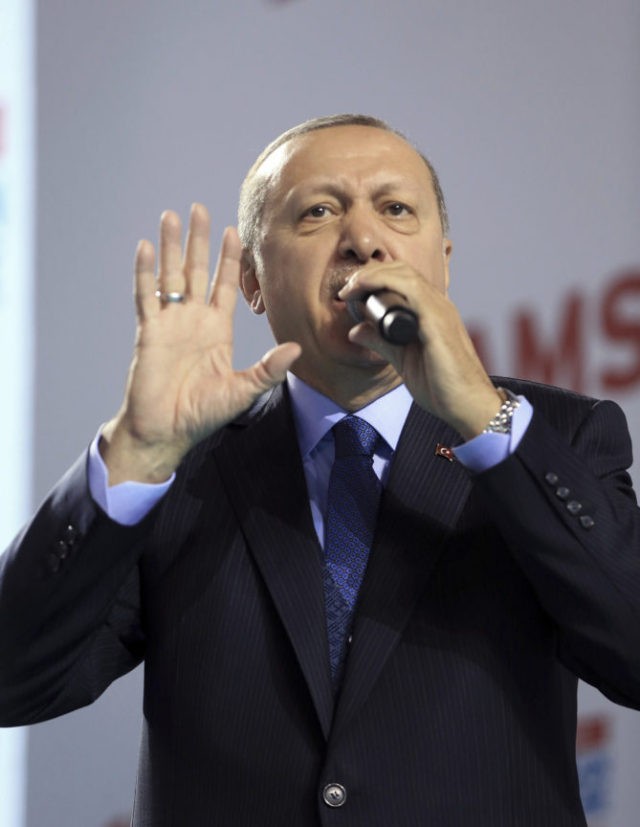Turkish Deputy Prime Minister Recep Akdag said on Tuesday that it is “completely inconceivable to return Afrin back to the control of the Syrian regime” after Turkey invaded the northern border region in January.
Turkey invaded Afrin with the ostensible goal of fighting “terrorists,” by which they meant the Kurdish forces occupying the city. Turkey believes these Kurdish militia groups are in league with the violent PKK separatist party. Afrin constitutes part of “Rojava,” the Kurdish term for Syrian Kurdistan.
“A free and democratic Syria can only be built without Assad. He has killed many of his fellow citizens and brought much suffering to his country,” Akdag declared.
“We want to give Afrin back to the local population, who should be there to decide for themselves,” he added. “A local Afrin council has been set up, which is a decision-making body with local representatives. Therein also Kurds sit.”
Turkey has fined anyone affiliated with the PKK or the Syrian Kurdish People’s Protection Units (YPG/YPJ) from sitting on the Afrin council. The YPG is the militia group that served as a vital battlefield ally for the United States against the Islamic State.
Akdag insisted that Turkey is still primarily interested in its own security needs and does not plan for a prolonged occupation, but it is difficult to see how Turkish forces would withdraw from Afrin any time soon under the terms he formulated. Bashar Assad is very firmly in control in Damascus, thanks to assistance from his patrons in Russia and Iran. The Syrian civil war has entered a protracted mopping-up phase, as the last few rebel enclaves were crushed with the alleged deployment of banned chemical weapons.
Turkey’s drive into Syria might have penetrated even further without American troops stationed in Manbij, the next major city the Turks would need to conquer.
The Manbij Military Council, an alliance linked to the Kurdish-led Syrian Democratic Forces, stated at the beginning of May that it would forcibly resist any Turkish military operation against the city.
The MMC statement also said Turkey “practices ethnic cleansing and mass genocide against our people in Afrin” for the purpose of “producing terrorist groups in areas where there is peace and coexistence.”
Turkish Foreign Minister Mevlut Cavusoglu is working this week on finalizing the details of a June meeting with U.S. Secretary of State Mike Pompeo to discuss the future of Manbij. There is much speculation that Pompeo will be less accommodating to Turkey than his predecessor Rex Tillerson was.
“Withdrawal of the YPG from Manbij is especially important here. However, the YPG’s withdrawal from Manbij alone is not enough. The stabilization of all regions under YPG control is also important,” said Cavusoglu.
He made it sound like Turkish forces might spend a long time in Manbij if they establish a foothold there, as he repeated Akdag’s policy of denying the Assad regime control of Syrian territory it lost during the civil war.
“Who will secure and administer these regions?” he asked. “Of course, in the future, when a political solution is possible, these must be integrated to the central administration.”
Turkey was furious when the Arab League demanded it withdraw troops and local militia allies from Afrin last month. Kurds in the region complained that Turkey’s operation was tantamount to ethnic cleansing. According to United Nations estimates, 137,000 of them were driven from their homes and not allowed to return, despite harsh winter conditions in the area.
Turkish Foreign Ministry spokesman Hami Aksoy blasted the Arab League for ignoring “Turkey’s work to reduce violence, maintain the political process in Syria, and provide a home to millions of displaced Syrian refugees.”
“The Operation Olive Branch in Afrin is a self-defense operation against terrorist organizations trying to divide Syria,” Aksoy insisted, using the sardonic name given to the Turkish operation.
In early May, the U.S. State Department criticized Turkey’s conduct in Afrin, citing the large number of people displaced from their homes and expressing “grave concern” for the humanitarian situation.
“We call on all relevant actors operating in the northwest to provide access for international humanitarian aid organizations and to allow for people to come home,” said State Department spokeswoman Heather Nauert.

COMMENTS
Please let us know if you're having issues with commenting.